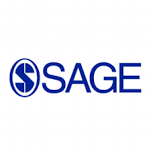Location
Founded in 1965, SAGE is a leading independent, academic and professional publisher of innovative, high-quality content.
Known for our commitment to quality and innovation, SAGE has helped inform and educate a global community of scholars, practitioners, researchers, and students across a broad range of subject areas.
With over 1,500 employees globally from principal offices in Los Angeles, London, New Delhi, Singapore, and Washington, D.C., we publish more than 900 journals and over 800 books, reference works and databases a year in business, humanities, social sciences, science, technology and medicine.
Believing passionately that engaged scholarship lies at the heart of any healthy society and that education is intrinsically valuable, SAGE aims to be the world’s leading independent academic and professional publisher. This means playing a creative role in society by disseminating teaching and research on a global scale, the cornerstones of which are good, long-term relationships, a focus on our markets, and an ability to combine quality and innovation.
Leading authors, editors and societies should feel that SAGE is their natural home: we believe in meeting the range of their needs, and in publishing the best of their work. We are a growing company, and our financial success comes from thinking creatively about our markets and actively responding to the needs of our customers.


